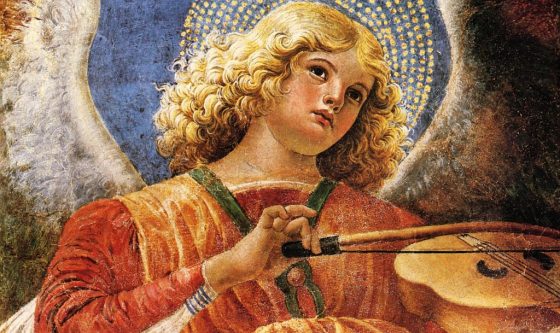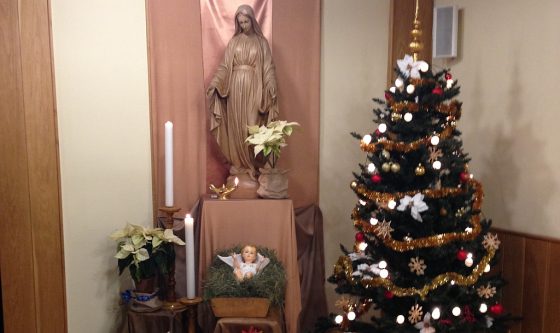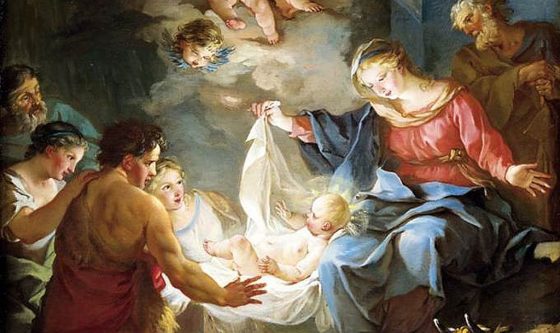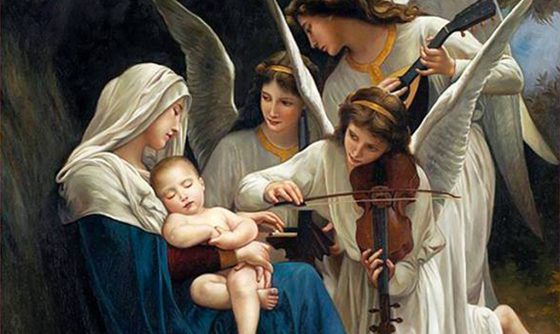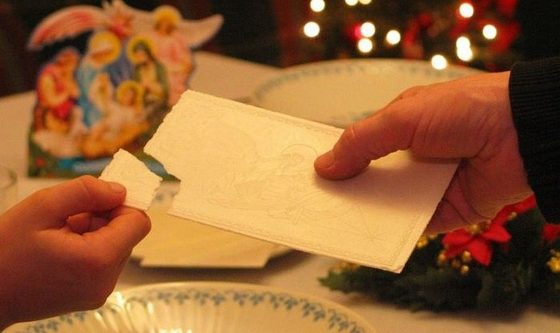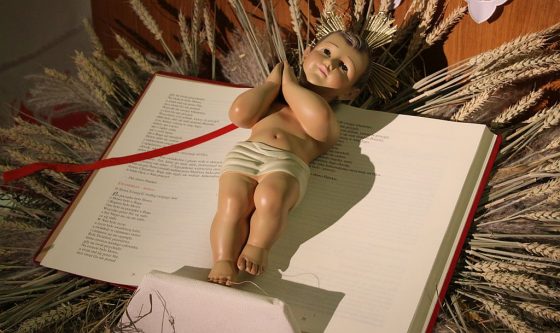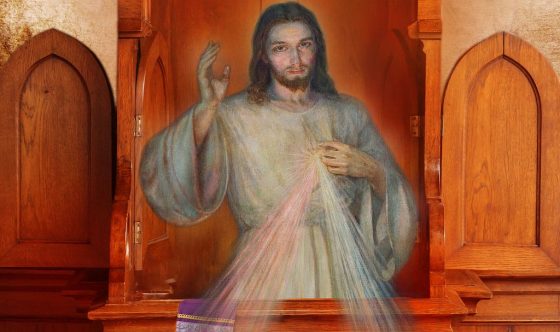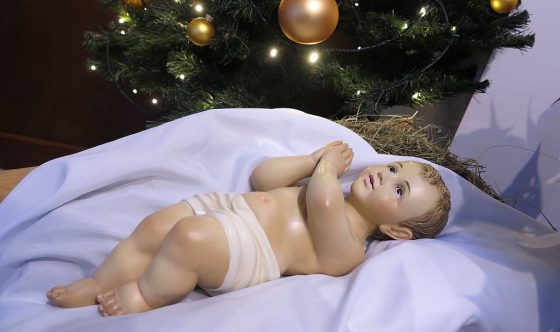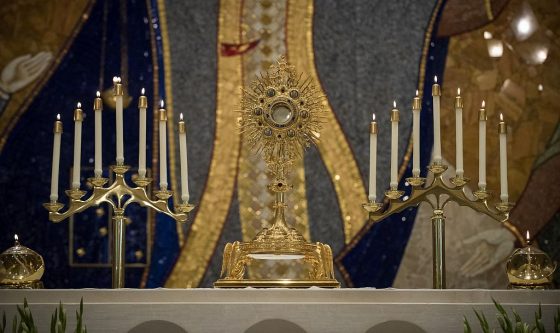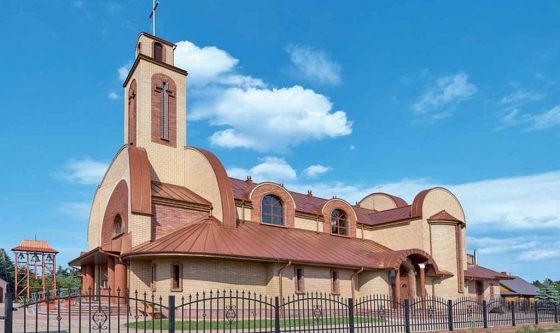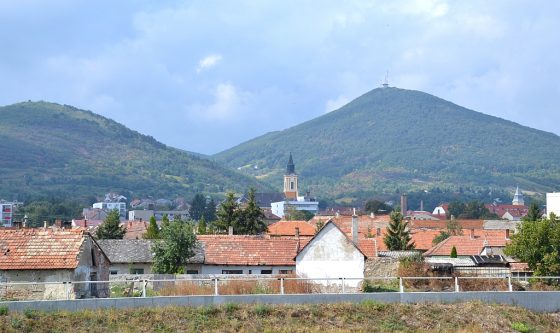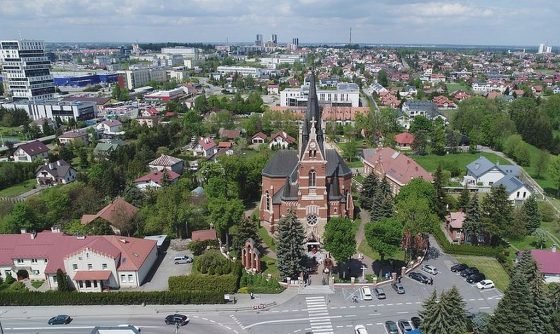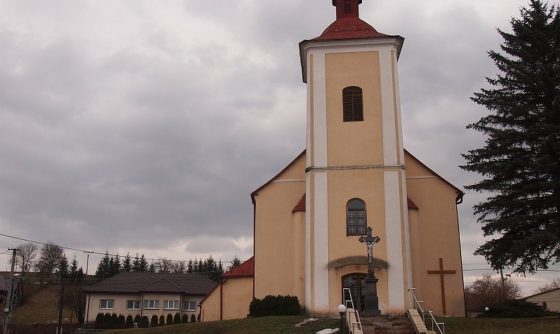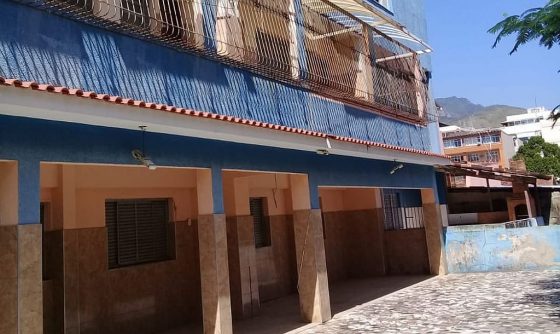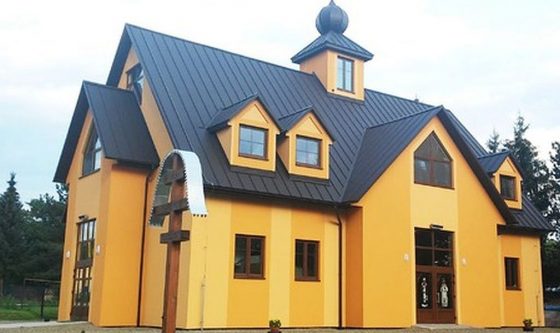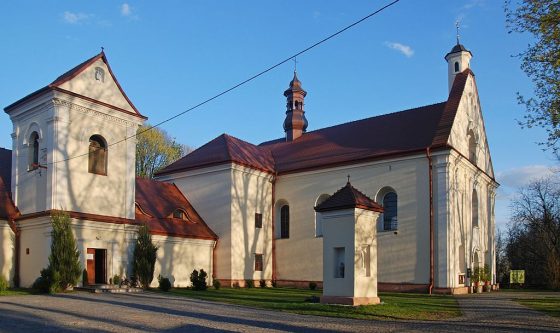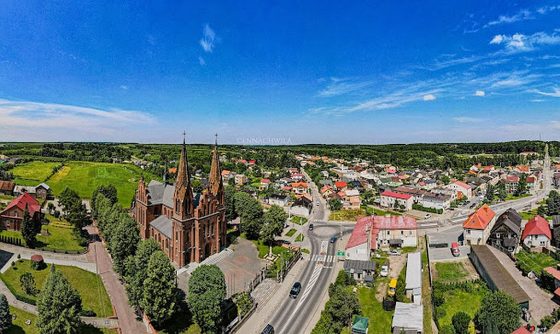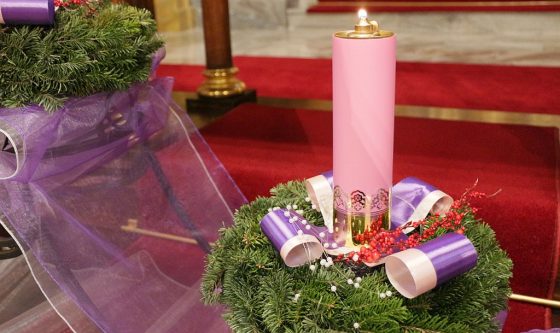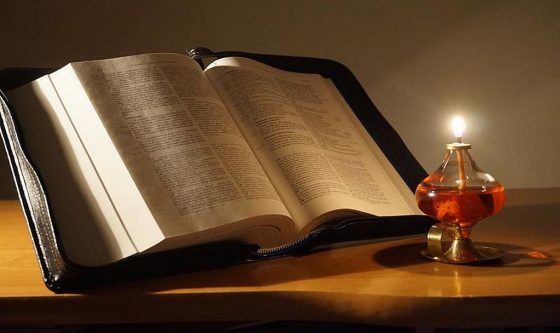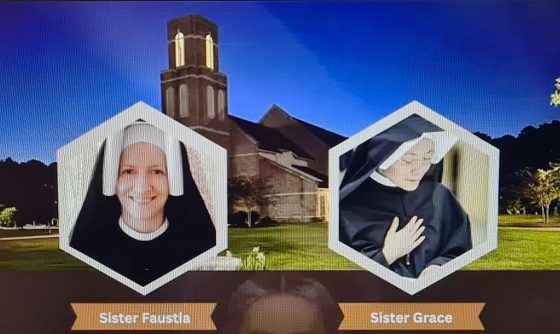As is tradition, on December 31 at 9:00 pm at the Shrine of Divine Mercy, adoration of the Blessed Sacrament will begin in the chapel of the famous Divine Mercy image and the tomb of St. Faustina. Adoration this year will be led by the sisters and will conclude at midnight with the celebration of the first Mass. Those unable to come to the shrine can join us by watching our online broadcast beginning with vespers at 7:00 pm and continuing with adoration and Mass. Please visit www.saint-faustina.org for more information.
Christmas is associated with the custom of decorating the Christmas tree that adorns the interiors of churches, homes, in addition to city squares and other public places. The coniferous tree is a symbol of life, rebirth, longevity and fertility in many cultures. A decorated fir or spruce tree has become Europe’s most recognizable symbol of Christmas. The living tree has also become a Christian symbol of Christ as the source of life. But also some Christmas tree decorations have their own symbolic meanings, although not always recognized today: for example, the star placed on top of the tree was supposed to show the way back home from far away, the lights point to Christ, who is the light of the world, the angels are the ones who take care of the household, the paper chains reminded people about the enslavement of sin from which Jesus frees us… In modern culture, however, presents placed under the Christmas tree seem to be more important. And yet, they are also a foreshadowing of the gifts of Heaven. It is worth to look at the Christmas tree remembering about its symbolic value, which Christian culture carries, to better and more fruitfully live the joyful mystery of Christmas.
This is how the mystery of the incarnation and birth of the Son of God was referred to by St. Faustina. In a beautifully poetic way, it was expressed by Franciszek Karpiński in the Polish Christmas carol:
Bóg się rodzi, moc truchleje,
Pan niebiosów obnażony.
Ogień krzepnie, blask ciemnieje,
Ma granice Nieskończony.
Wzgardzony, okryty chwałą,
Śmiertelny Król nad wiekami.
A Słowo ciałem się stało,
i mieszkało między nami.
[God is born and the night is shaken,
The Lord of Heaven lies naked,
Fire is frozen, light is veiled
The Eternal now has its limits.
He was scorned, yet clothed with glory,
Mortal King of the Ages!
And the Word was made flesh,
And dwelt among us.]
Infinite and eternal God took human form and became a man. No other religion in the world has such a god who is the Creator and Lord of all that exists, who is the One, holy, infinite, transcendent, all-powerful and all-knowing, ineffable by human or angelic reason, and at the same time so close to man in His Son embodied as a human person. The contemplation of Divine Mercy in this mystery brings the ineffable joy and awe, because God dwells among us, the Word of God, Mercy Incarnate (Diary, 1745).
Merciful love of God revealed in the nativity of Jesus is sung in liturgical hymns, and also in Christmas carols that are more secular. A particularly rich repertoire of hundreds of Christmas carols is inscribed in Polish national and religious culture. They are sung in every home, not only at the table on Christmas Eve, but also during Christmas time in churches, accompanying the liturgy and at various festive meetings. Many of these songs have lyrics and music composed by recognized poets and composers, and each year new are created. Christmas carols create a unique atmosphere of the holiday season, helping in prayer, contemplation and living the mystery of God’s Mercy revealed in the fact of the incarnation and nativity of the Son of God.
The very word for “eve” in Polish, wigilia, comes from the word “vigil”. This particular vigil is filled with prayer, fasting and other mortifications undertaken out of love for Jesus, as a direct preparation for the celebration of His birth in the human form. According to Christian tradition, when the first star appears in the sky (referring symbolically to the Star of Bethlehem, which heralded the birth of Jesus), Poles sit down to supper in their homes, religious orders and various other communities. The wafer that Poles break with their dear ones as they exchange greetings provides an opportunity for forgiveness and reconciliation and creates an atmosphere of love in which God is present. Saint Faustina described several Christmas Eves in her Diary. She commented on her last one, which she experienced in 1937 in Krakow: Before supper, I went into the chapel for a moment to break the wafer spiritually with those beloved persons, so dear to my heart, though far away. First, I steeped myself in a profound prayer and asked the Lord for graces for them all as a group and then for each one individually. Jesus gave me to know how much this pleased Him, and my soul was filled with even greater joy to see that God loves in a special way those whom we love. After I had gone into the refectory, during the reading, my whole being found itself plunged in God. Interiorly, I saw God looking at us with great pleasure. I remained alone with the Heavenly Father. At that moment, I had a deeper knowledge of the Three Divine persons, whom we shall contemplate for all eternity and, after millions of years, shall discover that we have just barely begun our contemplation. Oh, how great is the mercy of God, who allows man to participate in such a high degree in His divine happiness! At the same time, what great pain pierces my heart [at the thought] that so many souls have spurned this happiness (Diary, 1438-1439). May God be invited to every home, every Christmas table and every human heart! Only in Him and His Mercy will the world ever find peace and man will find happiness!
It is a tradition that a solemn Mass named Pasterka („Shepherds’ Mass”) is celebrated at midnight on Christmas Eve in Polish churches and chapels, including the ones of our Congregation. It is the first Eucharist of Christmas, which commemorates the expectation and prayer of the Bethlehem shepherds arriving to greet the Son of God born in flesh. A mystical experience of Sister Faustina described in her Diary brings us closer to the joyful mystery of Jesus’ coming to earth and living in clean hearts: As Holy Mass began, I immediately felt a great interior recollection; joy filled my soul. During the offertory, I saw Jesus on the altar, incomparably beautiful. The whole time the Infant kept looking at everyone, stretching out His little hands (Diary, 347). After Holy Communion, she writes elsewhere, I heard the words: I am always in your heart; not only when you receive Me in Holy Communion, but always (Diary, 575). We would like to wish you all to experience the joy that comes from the presence of God in our souls during the Midnight Mass, throughout the holidays and on every day of the New Year!
During the fourth week of Advent, St. Faustina will lead us deep into our souls, which also became the birthplace of Jesus in us. Jesus came to this world to be born in every human heart and make it happy. “I seek no happiness except in my interior”, she wrote, “in which God abides. I rejoice in God within me. Here I dwell constantly with Him; here I am at my most intimate with Him; here I safely dwell with Him, here is a place beyond the reach of human gaze. The Blessed Virgin is encouraging me to abide with God in this manner” (Diary, 454). Let us try to make the last days of Advent a time of the new birth of Jesus not only in our hearts through the Sacrament of Reconciliation, but let us strive to make sure that He finds a place in many human souls through our prayer and sacrifice.
The most important aspect of preparing for Christmas is concern about spiritual matters, so as to prepare for the new birth of the Son of God in your soul. This is why during this period we make a number of resolutions intended to organize our spiritual life, attend retreats and participate in the Sacrament of Reconciliation. In many shrines of Divine Mercy, including the ones in Krakow-Łagiewniki and Plock, as well as in other churches, long lines are setting up for confession. Without this, preparations for Christmas will be deprived of the deepest joy that is the presence of God in your soul and they might become just two days off from work and an opportunity to give presents which fill you with joy only briefly. You do believe that God was born in a Bethlehem manger, but woe to you if He is not born in you, wrote the poet Adam Mickiewicz.
On December 16 a novena to the Infant Jesus will start in all the convents of the Congregation of the Sisters of Our Lady of Mercy, including the chapel of the miracle-famous Image of Merciful Jesus and the tomb of St. Faustina in the Shrine of Divine Mercy. Traditionally, the antiphons sung and the Litany of the Infant Jesus recited there prepare the faithful spiritually for Christmas.
Let us spend the third week of this Advent contemplating the mystery of Divine Mercy in the Nativity of Christ. Sister Faustina wrote: “And the uncomprehended miracle of Your mercy is accomplished, O Lord: the Word is made Flesh, God – the Word of God, Mercy Incarnate – has come to dwell among us. You have raised us up to Your Divinity by stooping down to us here is the surfeit of Your love, the infinite depth of Your mercy. The Heavens are astounded at the surfeit of Your love. No longer does anyone fear to approach You. You are the God of mercy; You take pity on our wretchedness; You are our God, and we are Your people. You are a Father unto us, and we are Your children by Your grace; may Your mercy be praised for Your gracious coming down to us” (Diary, 1745). Let us follow St. Faustina in considering the merciful love of God in the miracle of the Son of God being born in the stable in Bethlehem and in the soul of man. Let us thank Him for wanting to be so close to us from birth through all the events of life until death, to live with us in the Father’s house and make us heirs to Heaven.
The Sisters from the community of our Congregation in Washington, D.C., organize the next “Evening with Merciful Jesus” on December 22nd at the John Paul II National Shrine in Washington, D.C . The special guest will be Joseph Roth, who titled his speech The robe, the ring and the fattened calf. Our Loving Father Who Restores Dignity. In it he will also share his own experience of leaving and returning to faith through the grace of a merciful God.
You can also join the event online atwww.jp2shrine.org/youtube. The lecture will be followed by Adoration of the Lord Jesus and a meet-up with refreshments.
“Evenings with Merciful Jesus” are organized for young people who want to follow St. Faustina and St. John Paul II to discover the new quality of life in friendship with the merciful Lord Jesus.
An Advent retreat on divine and human mercy will be held at the parish of Our Lady of Częstochowa in Lipa, Sandomierz diocese, on December 15-17. Based on the Bible and the heritage of St. Faustina, it will be delivered by Sr. Maria Vianneya and Sr. Maria Faustyna from the convent of the Congregation of the Sisters of Our Lady of Mercy in Krakow-Łagiewniki. Conferences for adults, teens and kids are on the agenda, as is the practice of forms of Divine Mercy devotion which Jesus Himself entrusted St. Faustina with.
On 15-17 December, a vocational retreat for young women will take place in the Discalced Carmelites’ monastery in Lorinčík near Košice in the south of Slovakia. The theme will be: “With Jesus by your side”. The retreat will be provided by Father Andrej Valent OCD and Sr. Benediktína Fečová from the Košice community of the Congregation of the Congregation of Our Lady of Mercy.
In the second week of Advent with St. Faustina, we would like to invite you to consider Divine Mercy in the mystery of the incarnation of the Son of God. “God, You did not allow Man to perish after his fall, but in Your mercy forgave him; You forgave him in a Divine manner, not only forgiving his sin but also bestowing all manner of graces upon him. Mercy prompted You to come to come down to us Yourself and lift us up out of our wretchedness. God, the Lord of Lords, is to come down on Earth, the Immortal One is to stoop down. But where will You come down, O Lord? To Solomon’s temple? Will You have a new abode built for You? Where do You intend to come down? O Lord, what kind of abode shall we build You, if the whole Earth is Your footstool? You have prepared an abode for Yourself: the Holy Virgin, Her immaculate womb is Your dwelling” (Diary, 1745). During this week, let us follow St. Faustina in contemplating the Mercy of God in the mystery of the incarnation of His Son, Who took on a human form in the womb of the Virgin Mary. Let’s be thankful that human nature became elevated in this way, and has been present in the mystery of the Trinity through Jesus ever since.
On Friday, December 15, an Advent retreat for children from the St. Margit Catholic Primary School will be held In Sátoraljaújhely, Hungary. Conferences on God’s merciful love toward us and on St. Faustina’s experience of Advent as the entire retreat will be delivered by Sr. M. Hedvig Uličná from the community of the Congregation of the Sisters of Our Lady of Mercy in Nižný Hrušov, Slovakia.
On December 9-10, the parish of St. Roch in Rzeszów will hold a ceremony to introduce the relics of St. Faustina with the participation of Sr. Ignacja Bazan from the convent of the Congregation of Our Lady of Mercy in Łódź (on Saturday at 6 pm). At Sunday Masses the following day, Sr. Ignacja will introduce the Apostle of Divine Mercy, her prophetic mission of proclaiming the message of mercy to the world, in which every person can join, as well as her deeply evangelical and universal school of spirituality based on learning the mystery of God’s merciful love and responding to it with an attitude of trust by doing His will and witnessing mercy to our neighbors.
On Sunday, December 10, the last formation meeting of this year for members and volunteers of the Faustinum Association will be held in Koprivnica (northern Slovakia). The group operates at the parish of St. Andrew the Apostle. The meeting will begin with a communal prayer at the Hour of Mercy. The program includes conferences on the theme of God’s mercy in the Bible and St. Faustina’s Diary, which will be delivered by the provost, Fr. Milan Slupek and Sr. Blanka Krajčíková of the community of the Congregation of Our Lady of Mercy in Slovakia.
Sister Faustina would begin every Advent with Virgin Mary. Before the Feast of the Immaculate Conception, she would practice a novena with the whole Congregation, and in addition to that, she would always try to offer something more to the Mother of God (e.g. a novena of a thousand Hail Marys). She considered mercy that Mary experienced as a gift of her immaculate conception and the fullness of grace guaranteed to her by Archangel Gabriel, and the gift of Divine motherhood. The one who was chosen to become the Mother of the Son of God knows best how to experience the period of awaiting the coming of Jesus. She advised Sister Faustina: “try to make yourself meek and humble, so that Jesus, Who dwells perpetually in your heart, may rest. Adore Him in your heart, do not leave your interior” (Diary, 785). This may also be our decision for this Advent week to prepare our hearts for God’s ever more complete presence therein.
On December 9, a day retreat will take place at the St. Faustina Retreat House in Rio de Janeiro with the motto For you I came down to Earth from Heaven. The retreat, which is organized as part of the Advent preparation for the coming of the Infant Jesus, Mercy Incarnate, will be delivered by Fr. Antônio José and Ss. Solange and Christofora of the Congregation of the Sisters of Our Lady of Mercy. This will be the first retreat held at the St. Faustina Retreat House in Rio, which the Sisters have been preparing since 2022.
On November 29, spiritual preparations for the celebration of the Immaculate Conception of the Blessed Virgin Mary will begin in all the houses of the Sisters of Our Lady of Mercy. There is to be a communal novena consisting of antiphons and the Litany of Loreto. In addition the sisters will be marking the Holy Day with an annual gift to the Mother of Mercy. Over and above the obligatory prayer in the convents’ chapels and her spiritual exercise, Saint Faustina used to make a novena which consisted in saying 1,000 „Hail Marys” each day. She admitted: Where there’s a will, there’s a way. Apart from recreation, I have only prayed and worked. I have not said a single unnecessary word during these days. Although I must admit that such a matter requires a good deal of attention and effort, nothing is too much when it comes to honoring the Immaculate Virgin (Diary, 1413). You yourselves can also take part in the prayer online, thanks to our live transmissions from the Shrine of Divine Mercy in Krakow-Łagiewniki.
On December 5th, at the Shrine of Divine Mercy in Krakow-Łagiewniki, Mass will be celebrated at 5 pm in the intentions of all the sponsors, donors and contributors of the media works carried out by the Congregation of the Sisters of Our Lady of Mercy, and especially those who support the Chaplet for the Dying at www.faustyna.pl and its language versions. Thanks to this support each year we are helping about 40 thousand dying people. Hundreds of thousands of individuals around the world can make a virtual pilgrimage to the Shrine of Łagiewniki and connect in prayer next to the miracle-famous image of Merciful Jesus and the tomb of St. Faustina. Sisters from the Congregation of Our Lady of Mercy pray daily for the donors and benefactors who support the work, but this particular Eucharist will be a special gift of gratitude. You can join this celebration via the live video broadcast at www.saint-faustina.org and in the Faustyna.pl application.
On December 1-3, in the town of Konayev (Almaty diocese), the parish of the Immaculate Conception of the Blessed Virgin Mary will hold a retreat for women under the theme If you knew the gift of God. It will be led by Sister Anastasis Omelchenko and Sister Angelina Stolareuskaja from the Petropavlovsk community of the Congregation of Our Lady of Mercy, and Nazareth Sister Kazimiera Wanat. The retreat will include meditations on the word of God, workshops and conferences. Each day, the sisters will also visit orphanages in the parish to acquaint children and teens with the message of Mercy as recorded in the Diary of St. Faustina. The parishioners will hear about this message during Sunday Mass.
A spiritual retreat will be held at the Shrine of Divine Mercy in Krakow-Łagiewniki on December 1-3. The participants will be looking for an answer to the question that touches every human being: how to find joy in the midst of suffering, based on the Scripture and the spiritual heritage of St. Faustina. The motto will be the words of the Apostle of Divine Mercy: “With You, O Jesus, I am making my way through life, come rain or shine, with a cry of joy and singing the hymn of Your mercy” (Diary, 761). The retreat will be delivered by Fr. Przemysław Sawa, Doctor in dogmatic theology, employee of the Faculty of Theology at the University of Silesia in Katowice, founder of the Cyril and Methodius School of Evangelization, retreatist and missionary of mercy, and Sr. Maria Faustyna Ciborowska from the convent of the Congregation of Our Lady of Mercy in Krakow-Łagiewniki, Doctor in biblical studies, involved in preaching the message of Mercy and leading retreats. The retreat is organized by the Faustinum Association of Apostles of Divine Mercy. For more information, go to www.faustinum.pl.
A parish retreat on Divine Mercy will be held at the Vasil Hopek Greek Catholic parish in Stropkove, Slovakia, on December 1-3. At the invitation of Fr. Slavomír Tarasovič, V.F., it will be led by Sr. M. Benediktína Fečová from the Košice community of the Congregation of Our Lady of Mercy. The program includes conferences (on Saturday especially for women and mothers), Adoration, praying the Hour of Mercy and the Chaplet to Divine Mercy, and veneration of the relics of St. Faustina.
On December 3, the first Sunday of the Advent, Sr. Ignacja Bazan from the convent of the Congregation of Our Lady of Mercy in Łódź will share the message of Mercy and the spiritual legacy of St. Faustina as recorded in her Diary, with the faithful in the parish of the Immaculate Conception of the Blessed Virgin Mary in Horyniec Zdrój (Diocese of Zamość-Lubaczów). At 7 p.m. there will be Adoration and meeting with Jesus the Merciful under the theme: Kindle the Spark of Mercy.
On November 26-29, the parish of St. Florian the Martyr in Mogielnica, the Diocese of Warsaw, will host a Divine and human mercy parish retreat. Based on the Bible and the heritage of St. Faustina, it will be delivered by Sr. Maria Vianneya and Sr. Tobiana from the convent of the Congregation of the Sisters of Our Lady of Mercy in Krakow-Łagiewniki and Sr. Mariam from the convent in Warsaw. Conferences for adults, teens and kids are on the agenda, as is the practice of the new forms of Divine Mercy devotion which Jesus Himself entrusted St. Faustina with.
Advent is approaching, Sister Faustina wrote in her Diary. I want to prepare my heart for the coming of the Lord Jesus by silence and recollection of spirit, uniting myself with the Most Holy Mother and faithfully imitating Her virtue of silence, by which She found pleasure in the eyes of God Himself. I trust that, by Her side, I will persevere in this resolution (Diary, 1398). This year, the first Sunday of Advent falls on 3th of December. Liturgically, Advent and the new year in the liturgy of the Church begins with vespers on December 2th. It constitutes a time of joyful anticipation of Christmas, spiritual preparation for this holiday and for the second coming of Christ on Earth, in addition to building our sensitivity to His everyday coming to us here and now, as St. Faustina did, through exercise in silence and recollection of spirit. The joy of experiencing the mystery of faith which tells us of the birth of the Son of God in human flesh, Mercy Incarnate, depends on this expectation and spiritual preparation.
Starting on November 20, the Apostles of Divine Mercy Faustinum Association will be accepting applications for retreats with the Bible and the Diary of St. Faustina, to be organized in the first half of 2024. Registration for the retreat can be done only through the registration form at www.faustinum.pl or sent in paper form to the address of the secretariat of Faustinum at the Shrine of Divine Mercy in Krakow-Łagiewniki. Only receipt of confirmation from the secretariat of the Faustinum is tantamount to enrollment in the selected retreat.
The Retreat with the Bible and the Diary of St. Faustina is a time to explore the mystery of God’s mercy revealed in the Bible with Sister Faustina, as well as a time of personal encounter with God in seclusion and in complete silence. The retreats are conducted by priests in cooperation with sisters from the Congregation of Our Lady of Mercy. All members and volunteers of the Faustinum and those who wish to learn more deeply and experience the mystery of God’s mercy are invited to attend.
Program and application form and more information at: www.faustinum.pl.
On 18-23 November, Sister Faustia and Sister Grace from the D.C. Community of the Congregation of the Sisters of Our Lady of Mercy will deliver a retreat at the parish of St. Anne in Georgia, Diocese of Savannah. The conferences will focus on God’s mercy in the holy sacraments and in daily life. During the first few of the retreat the target participants will be adults, while just before November 20, the retreat program includes meetings with young people about God’s mercy in the family and mutual relationships.
This is the theme of a retreat devoted to vocation discernment which will be held at the Shrine of Divine Mercy in Krakow-Łagiewniki on November 24-26, 2023. It will be delivered by Sr. M. Evangelista Sobkowicz, I.S.M.M., and Dr. Monika Guzewicz. Participants of this retreat will discover what the true happiness of God and man is, and will explore it in the perspective of earthly and eternal life.











